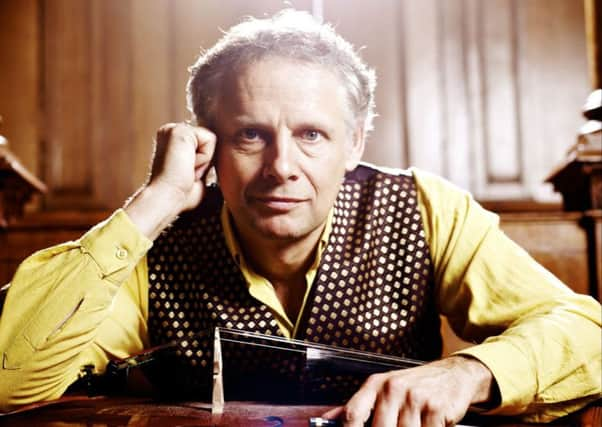Music at Paxton: '˜It's going to be slightly experimental'


I’ll actually be at Paxton as a normal cellist.” That’s a strange statement for an international soloist to make. And what makes him “normal” anyway?
Dutch-born cellist Pieter Wispelwey is arguably far from “normal” – he’s one of the most versatile musicians around today, with an astonishingly broad repertoire from Bach right through to the present day. But he has his tongue slightly in his cheek here. He’s celebrated for his authentically light, tripping, vivid performances of Baroque music, using cello, bow and techniques from the time of Bach and Handel. And at this year’s Music at Paxton festival, he’s offering three of Bach’s six suites for solo cello, in an intimate concert that sold out so quickly a repeat performance had to be hastily arranged. But he’ll be doing them, not on his Baroque cello, but on a “normal”, modern instrument.
Advertisement
Hide AdAdvertisement
Hide Ad“It’s been a long journey finding a proper translation for playing the Bach suites on a modern cello,” Wispelwey explains, “while still preserving some of the playing techniques of a Baroque instrument. I’ve spent a decade on it, but I feel I’ve arrived somewhere. And now I feel very comfortable playing them on my Guadagnini cello.”
Ironically, that “modern” instrument, made by one of the most eminent Italian luthiers, has an impressive history itself, dating back to 1760, just a decade after Bach died.
There are logistical issues about Wispelwey’s choice of instrument too. “In my early days I’d travel about with two or three cellos, and often someone would travel with me. But airlines were a lot easier to deal with 20 years ago.”
But behind those practical necessities lie Wispelwey’s broad, generous thinking about musical performance. We’ve come a long way from the dogmatic days of the 1970s and 1980s when certain hardline conductors would insist on period instruments, period playing styles and plenty more for anything pre-Brahms. And refreshing though that shake-up was, nowadays musicians, including Wispelwey, are happy with a more nuanced, less polarised approach.
“I’ve always had a relaxed attitude towards historical performance,” he says. “I think you have to discover the style in an experimental way. You have to find out what’s most expressive, what does most justice to the music. If you play Bach in a 19th-century style, it simply doesn’t sound convincing, nor meaningful enough. But we also have to accept that we have no realistic idea of how people played in Bach’s time. And what would have been the correct performance anyway? Surely the first performance can’t have been the best – so was the tenth performance ideal? Does that mean that the 11th performance was already wrong?’
Alongside his two solo Bach recitals, Wispelwey is resident in Paxton House’s 18th-century splendours across the festival’s first weekend, playing trio concerts with two other eminent soloists, violinist Alina Ibragimova and pianist Cédric Tiberghien, including an all-Beethoven recital. “This is going to be slightly experimental,” Wispelwey admits, since the threesome have never played together before. “Cédric and I have given lots of recitals, and Alina is a regular duo partner of Cédric’s too, so it was obvious to see how we’d feel about playing in a trio. That’s what we’re trying out this summer – we’ll see what sort of chemistry we have.”
He also joins the UK’s Doric Quartet for Schubert’s ineffable String Quintet. “And no, I haven’t played with the Dorics either, but we’ll spend a lovely afternoon discussing and playing, working together on how we approach the music. You can either rehearse for a full week together and pick everything apart, or you can work intensively over a short period. There’s not really any middle ground. It’ll be a meeting of minds.’
Advertisement
Hide AdAdvertisement
Hide AdAnd a meeting of musical styles for Wispelwey, from Bach to Beethoven, Schubert and beyond. He’s one of the most perceptive and intelligent musicians working today, and his Paxton residency offers ample opportunity to sample his artistry – both solo, and in what promise to be intriguing new collaborations.
• Music at Paxton runs from 15 to 24 July, at Paxton House, near Berwick-upon-Tweed, www.musicatpaxton.co.uk